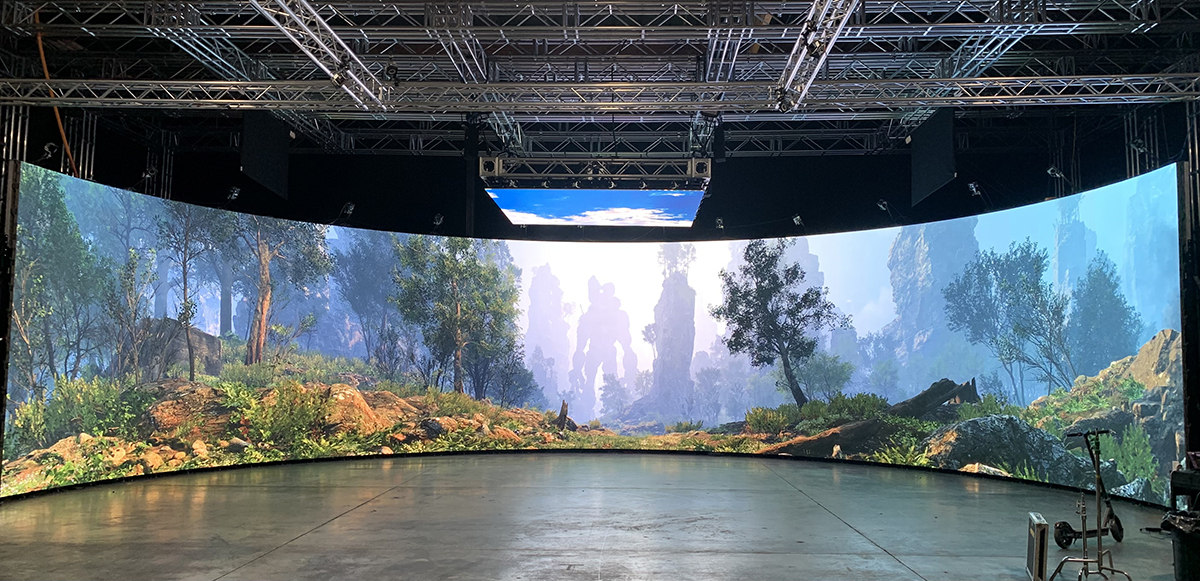
TL;DR
- A group of industry leaders gathered to present the “Gaijin Collective State of the Industry Report” focused on the evolution and growth of virtual production.
- The panel highlighted the shift towards openness, collaboration, and the sharing of information between competitors as key to fostering the VP ecosystem.
- Because the industry is still young — and highly specialized — educating clients about VP outweighs aggressive competition, the panelists agreed.
- Balancing commercial work alongside educational partnerships will help ensure the continual development and adoption of VP technology.
Four prominent players in the world of virtual production shared their insights into the rapidly growing field at the 2023 NAB show. The “Gaijin Collective State of the Industry Report” included A.J. Wedding, co-founder of Orbital Virtual Studios; Tim Moore, CEO of Vū Technologies; J.T. Rooney, President of XR Stages; and Erik Weaver, director of adaptive production at the ETC (Entertainment Technology Center) at the University of Southern California. The panelists discussed the OSVP industry, opportunities for growth, and the importance of sharing information among competitors in order for the ecosystem as a whole to thrive.
The participants agree that VP has changed since the LED-wall based systems came on the scene. “People were more closed off,” recalls Rooney, whose work has primarily focused on live entertainment. “It is now growing into a real industry, and with that comes relationships and friendships. There’s a real difference between popping up [an LED] wall and making something work day in and day out.”
Wedding, who has been involved in the film, post and VFX industries for 20 years, notes that openness is not only not the antithesis of competition. In fact, he says, it can be the opposite. There is so much for most people to learn about what VP actually is that it can be far more important to educate prospective clients about the process overall than it is to aggressively compete.
Wedding breaks down how, even among each of the speaker’s businesses there are unique specialties. “They can be specialized as more designed for cinematic work or broadcast or XR (extended reality) and AR (augmented reality), which is different from projects based around a live theater performance,” he said.
“We’re both in Los Angeles,” Wedding, whose company did work on the FX series Snowfall, adds, “but whenever somebody comes to me and wants to do XR, I send them to [Rooney’s XR Stages]. I’m not going to mess with that! It’s a whole separate thing, even though we all have LED walls and tracking solutions.”
Rooney points out that VP is still such a young technology that there’s no agreement yet about standard terminology. “If you talk about virtual production, you’re using one name to describe a workflow across something like 10 different industries,” he says, noting that even what we refer to simply as “production” actually comprises many different things. “Does that mean a single-camera shoot from inside someone’s basement in Cleveland or what happens on a Hollywood set? It’s all ‘production,’ but there are a million ways to talk about it.”
Another sub-specialty of VP, what Orbital refers to as “digital prosthetics,” involves what Wedding defines as a “‘live deepfake.’ It’s somewhat controversial but also very helpful in certain circumstances. If you’re going to do alien makeup which would require that an actor sit in a chair for nine hours or the actor can just walk on stage and perform.”
“You have to learn on the job in real time,” Weaver chimes in. Further, it’s hard to formalize workflows and nomenclature, when, as Rooney says, “every single vendor and every single piece of equipment we have in the studio is either a beta or an alpha version of something — firmware, software.”
Weaver suggested stages target 80 days a year for commercial work and giving away 20+ plus days a year to educational partnerships, especially with universities.
The dissemination of useful information, whether it comes from the people who run the VP studios or through education partnerships, is according to Wedding, “part of keeping the industry going. If people stop using virtual production because they had a bad experience, then we’re all screwed.”

